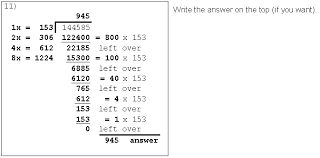November 17th, 2022 at 3:54:57 AM
permalink
In a recent thread this question was posed,
I guess there is an answer which I probably won't investigate,
https://history.stackexchange.com/questions/41435/how-did-the-romans-do-division
However, intuition tells me "they probably would surprise" with the familiarity they had with just how to go about it, at least those with mathematical expertise. That might not have included too many of the other, regular scholars, unlike in my day, when every school child was taught long division without using calculators. The newfound facility making such a broad attempt possible was indeed the adoption of Arabic numerals, I don't doubt.
On the other hand, the method we were taught involved guessing ... trial and error, that is, so we faced the same thing as the Romans to that degree. Approaching the below, it helps to know approximate logarithms, so something * 10^5 divided by something * 10^2 would tell you something * 10^3 is a likely place to start, but as you can see, no substitute for trial and error anyway. The 1x, 2x, etc is some kind of help provided I suppose along the same lines.

But the main reason I wanted to post was to recommend watching this TV program, if you haven't
Quote: billryanEver try dividing MXM by CVIII? I don't know how the Romans managed without zero.
link to original post
I guess there is an answer which I probably won't investigate,
https://history.stackexchange.com/questions/41435/how-did-the-romans-do-division
However, intuition tells me "they probably would surprise" with the familiarity they had with just how to go about it, at least those with mathematical expertise. That might not have included too many of the other, regular scholars, unlike in my day, when every school child was taught long division without using calculators. The newfound facility making such a broad attempt possible was indeed the adoption of Arabic numerals, I don't doubt.
On the other hand, the method we were taught involved guessing ... trial and error, that is, so we faced the same thing as the Romans to that degree. Approaching the below, it helps to know approximate logarithms, so something * 10^5 divided by something * 10^2 would tell you something * 10^3 is a likely place to start, but as you can see, no substitute for trial and error anyway. The 1x, 2x, etc is some kind of help provided I suppose along the same lines.
But the main reason I wanted to post was to recommend watching this TV program, if you haven't
the next time Dame Fortune toys with your heart, your soul and your wallet, raise your glass and praise her thus: “Thanks for nothing, you cold-hearted, evil, damnable, nefarious, low-life, malicious monster from Hell!” She is, after all, stone deaf. ... Arnold Snyder


